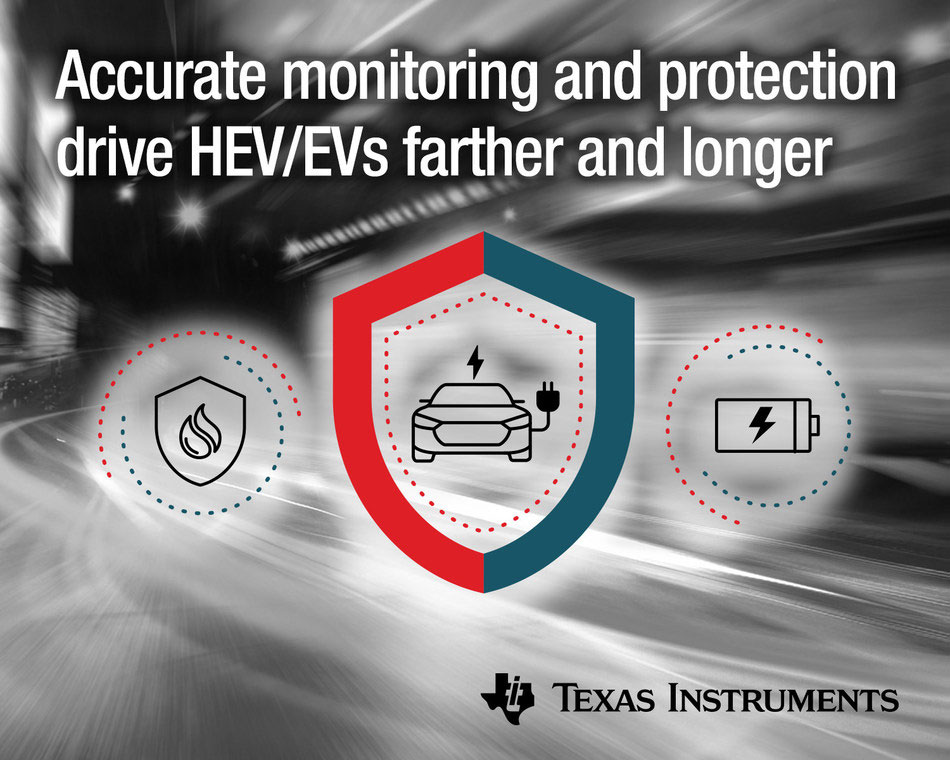 New reference designs and analog integrated circuits provide safeguards to maximize drive time
New reference designs and analog integrated circuits provide safeguards to maximize drive time
DALLAS and INDIA, May 1, 2019 – Texas Instruments (TI) (NASDAQ: TXN) today introduced fully tested reference designs for battery management and traction inverter systems, along with new analog circuits with advanced monitoring and protection features to help reduce carbon dioxide emissions and enable hybrid electric vehicles and electric vehicles (HEV/EVs) to drive farther and longer.
Speed time to market while achieving more accurate battery monitoring
Scalable across six to 96-series cell supervision circuits, TI’s new battery management system (BMS) reference design features the advancedBQ79606A-Q1 precision battery monitor and balancer. Engineers can get their automotive designs to market quickly using the reference design, which implements the battery monitor in a daisy chain configuration to create a highly accurate and reliable system design for three- to 378-series, 12-V up to 1.5 kV lithium-ion battery packs.
The highly integrated BQ79606A-Q1 accurately monitors temperature and voltage levels and helps maximize battery life and time on the road.Additionally, the BQ79606A-Q1 battery monitor features safe-state communication that helps system designers meet requirements up to Automotive Safety Integrity Level D (ASIL D), which is the highest functional safety goal defined by the ISO 26262 road vehicles standard.
Reliable thermal management across the traction inverter system
With so many kilowatts of power filtering through an electric vehicle’s traction inverter and batteries, high temperatures could potentially damage expensive and sensitive powertrain elements. Excellent thermal management of the system is crucial to vehicle performance, as well as protecting drivers and passengers.
To protect powertrain systems such as a 48-V starter generator from overheating, TI introduced the TMP235-Q1 precision analog output temperature sensors. This low-power, low-quiescent-current (9-µA) device provides high accuracy (±0.5°C typical and ±2.5°C maximum accuracy across the full operating temperature from -40°C to 150°C) to help traction inverter systems react to temperature surges and apply appropriate thermal management techniques.
Advanced protection without sacrificing space in traction inverter systems
The TMP235-Q1 temperature sensing device joins the recently released UCC21710-Q1 and UCC21732-Q1 gate drivers in helping designers create smaller, more efficient traction-inverter designs. These devices are the first isolated gate drivers to integrate sensing features for insulated-gate bipolar transistors (IGBTs) and silicon carbide (SiC) field-effect transistors, enabling greater system reliability in applications operating up to 1.5 kVRMS and with superior isolation surge protection exceeding 12.8 kV with a specified isolation voltage of 5.7 kV. The devices also provide fast detection times to protect against overcurrent events while ensuring safe system shutdown.
To power the new gate drivers directly from a car’s 12-V battery, TI has released a new reference design demonstrating three types of IGBT/SiC bias-supply options for traction inverter power stages. The design consists of reverse-polarity protection, electric-transient clamping and over- and under-voltage protection circuits. The compact design includes the new LM5180-Q1, which is a 100 V, 1 A synchronous step-down converter with very low 10-µA typical standby quiescent current.
Product packaging, availability and pricing
Pre-production samples are available now in the TI store. The table lists pricing and package type.
| Product | Package type | Price (1,000-unit quantities) |
| BQ79606A-Q1 | 48-pin, 9-mm-by-9-mm HTQP package | US$5.49 |
| TMP235-Q1 | 5-pin, 2-mm-by-1.25-mm SC-73 package | US$0.18 |
| LM5180-Q1 | 8-pin, 4-mm-by-4mm WSON package | US$3.86 |
| UCC21710-Q1 | 16-pin plastic small-outline integrated circuit (SOIC) | US$4.00 |
| UCC21732-Q1 | 16-pin plastic SOIC | US$4.00 |
Learn more about TI’s extensive reference designs and integrated circuits across powertrain systems at TI.com/EV.
